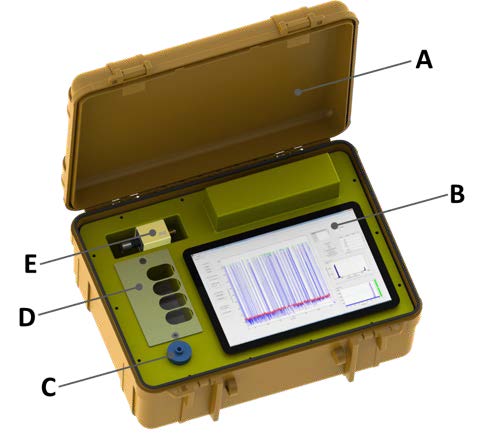SCCWRP to test suitcase-sized microbial detection device

A suitcase-sized instrument that could revolutionize the speed at which beach ocean water is tested for microbial contamination is being prepared for an initial round of testing and calibration at SCCWRP after five years of research and development.
The droplet digital PCR instrument was delivered to SCCWRP in early August by Arizona State University researchers, who collaborated with SCCWRP and the Monterey Bay Aquarium Research Institute to conceptualize and build this portable water-quality testing device.
Unlike traditional methods that require water samples to be analyzed in a lab – a process that can take up to 24 hours – the ddPCR machine can be used by a field technician on the beach, producing results within two hours.
SCCWRP, a world leader in adapting ddPCR for environmental monitoring, is preparing to launch extensive laboratory testing of the device, using both cultures and environmental samples.
Then, in the spring, SCCWRP will begin field testing, followed by beta-testing by local agencies, including SCCWRP’s member agencies.
Over the past five years, SCCWRP and the Monterey Bay Aquarium Research Institute have provided expertise and guidance to the Arizona researchers about the design of a reliable, field-deployable ddPCR instrument with an interface so simple that even a beach lifeguard will be able to operate it.
About the size of a small suitcase, the ddPCR instrument will have the capability to detect and quantify microbial targets in the field within two hours of collection.
Shortening the testing window means that public-health officials can warn beachgoers much faster about potentially dangerous levels of pathogens in the water.
This technology also could helpinvestigators follow sources of fecal bacteria and other aquatic contamination to their upstream origin.
SCCWRP’s pioneering work to adapt mobile PCR technology to monitor microbial contaminants in beach ocean water is featured in a new overview article in the journal Nature Methods.
The five-page article, headlined “PCR heads into the field” and published in the journal’s May issue, devotes an extensive write-up to SCCWRP’s ongoing efforts to develop a mobile, suitcase-style laboratory that can more rapidly detect microbial contaminants using droplet digital PCR.
Nature Methods is a publication of the prestigious journal Nature that focuses on laboratory techniques and practices.
The journal quotes Dr. John Griffith, head of the Microbiology Department, discussing the many potential applications of this mobile testing lab, including rapid detection of disease-causing pathogens in fishery waters and inclusion as a sensor on autonomous underwater vehicles.
SCCWRP’s research on using ddPCR methods to develop rapid microbial monitoring methods also was featured last year in a magazine article and accompanying short documentary from the life sciences company Bio-Rad.
For more information about SCCWRP’s ddPCR work and to request a copy of the Nature Methods article for personal use, contact John Griffith.
For more information about the portable ddPCR instrument, contact Dr. John Griffith.
More news related to: Microbial Source Tracking, Microbial Water Quality, Top News